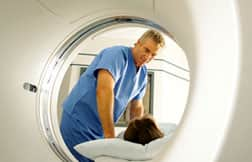
Newsletter
Newsletter
N Acetylcysteine Could Make Lung Cancer Screening Safer
N-acetylcysteine could make lung cancer screening safer
Tuesday, November 6, 2012. The results of a study reported on October 26, 2012 in the journal Carcinogenesis suggest that administration of the antioxidant amino acid N-acetylcysteine (NAC) could help protect men and women at risk of lung cancer from the cancer-promoting effects of computed tomography (CT) screening. Annual CT screening of heavy current and former smokers who are at high risk of developing lung cancer was found to reduce lung cancer mortality by 20 percent in comparison with screening with chest x-rays in a recent trial. However, a concern has been raised regarding the risks associated with the relatively high amount of radiation delivered by CT scans, which could induce cancer in normal cells or promote the growth of precancerous cells. Researchers at Wake Forest School of Medicine in North Carolina treated male and female mice with NNK (a carcinogen found in tobacco smoke) and exposed them to varying doses of whole body CT radiation or no radiation weekly for four weeks. A separate group of female mice was given a diet enhanced with N-acetylcysteine beginning three days before irradiation, and continuing for the four week radiation treatment period. Some females that did not undergo radiation also received a diet enhanced with NAC. "We chose NAC as this agent has been shown to inhibit lung tumor formation in mice and to attenuate increases in reactive oxygen species and subsequent DNA damage by a variety of environmental stressors," author Mark Steven Miller and his colleagues write. "In addition, NAC is a relatively inexpensive nutriceutical that is readily available over-the-counter." Eight months following the final radiation treatment, the mice were examined for lung tumors. Irradiated mice had up to twice the incidence of tumors compared to those that did not undergo radiation, with females experiencing greater effects than males. Treatment with NAC resulted in an amount of tumor formation in irradiated mice comparable to that of animals that were not irradiated. "Our data suggest that exposure of sensitive populations to CT radiation increases the risk of tumorigenesis and that antioxidants may prevent the long term carcinogenic effects of low dose radiation exposure," the authors conclude. "This would allow annual screening with CT while preventing the potential long term toxicity of radiation exposure." | ||||||||||||||||
 | ||||||||||||||||
| ||||||||||||||||
| ||||||||||||||||
 | ||||||||||||||||
|
| ||||||||||||||||
|
| ||||||||||||||||






